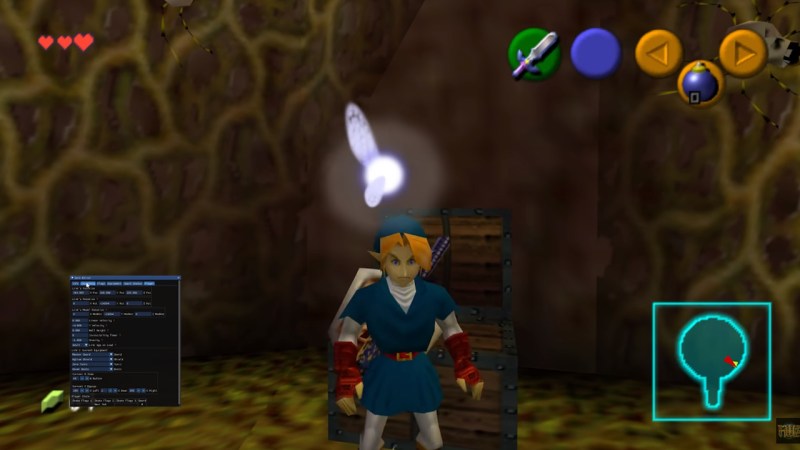Over the past few years a number of teams have been putting a lot of effort into taking beloved Nintendo 64 games, decompiling them, and lovingly crafting them into highly portable C code. This allows for these games to not only run natively on PCs, but also for improvements to be made to the rendering engine and other components.
Yet this artisan approach to porting these games means a massive time investment, something which static binary translation (static recompilation) may conceivably speed up. Enter the N64: Recompiled project, which provides a binary translation tool to ease the translation of the N64’s binaries into C code.
This is effectively quite similar to what an emulator does in real-time, just with the goal of creating a permanent copy of the translated instructions. After this static binary translation, the C code can be compiled again, but as noted by the project’s documentation, a suitable runtime is needed to get a functional game. An example of this is the Zelda 64: Recompiled project, which uses the N64: Recompiled project at its core, while providing the necessary scaffolding and wrappers to create a working copy of The Legend of Zelda: Majora’s Mask as output.
In the video below, [Modern Vintage Gamer] takes the software for a test drive and comes away very excited about the potential it has to completely change the state of N64 emulation. To be clear, this isn’t a one-button-press solution — it still requires capable developers to roll up their sleeves and get the plumbing in. It’s going to take some time before you favorite game is supported, but the idea of breathing new life into some of the best games from the 1990s and early 2000s certainly has us eager to see where this technology goes
Thanks to [Keith Olson] for the tip.
















In before Nintendo sends the C&D.
You must legally own the N64 cartridge that you wish to recompile.
I believe that falls under “Fair Use”.
Supplying the recompiled programs to others is illegal.
I mean “would be” illegal.
Yeah, this seems to be an under-appreciated gotcha with this technique.
There are other decompile efforts that took the time to RE the software, write up a specification, and write a clean work-alike from scratch which is unencumbered by copyright. In theory you could package one with your own assets and ship it as a homebrew game without people needing to own the original.
In the case of this technique, even if you’re distributing the transpiled game code without the art assets, you’re still violating it’s copyrights. That means you need to ship the transpiler itself and every user needs to run their own game roms through the transpiler themselves.
“That means you need to ship the transpiler itself and every user needs to run their own game roms through the transpiler themselves.”
Yes, that’s exactly what this is doing. Why is this a downside? The end user needs the art assets and the only way they’re going to get them legally is a nicely packaged readout which conveniently also includes the game.
In before people ignore C&Ds, as they should.
To whom? The usual solution is to stay anonymous and drop the releases into a file sharing site somewhere, let peers seed it after that
Idk, to the channel that posted the linked video? Nintendo is notoriously litigious and will go after anyone for the most petty nonsense. That’s all I meant.
There’s no Nintendo code here. You need to supply that. Translating existing copyrighted code (which isn’t distributed) to operate on another platform has long been legal (at least in the US).
It basically acts like an emulator: you open it up and load the game data, which includes the code for the game itself, it recompiles it and then runs Stupid Fast.
That has literally never stopped Nintendo from suing people, though.
They don’t need to win the lawsuit. They need to bankrupt you with legal fees fighting the lawsuit.
“That has literally never stopped Nintendo from suing people, though.”
What lawsuit are *you* thinking of? Yes, Nintendo’s gone after people aggressively, but that’s because copyright and the DMCA are very broad.
There’s clearly no copyright case here and there’s no DMCA case either since there’s no game encryption pre-Wii.
Does this mean that you could replace entire models with ones that are more complex and made out of more polygons? Or is it more limited than that?
Yes, with the source code available you could hack in any way you want.
See the first thing I thought of was giving WWE No Mercy a graphical upgrade. Then the second thing I thought of was a HD remake of Diddy Kong Racing. Somebody already remade the lobby area from that in Unreal engine.
What about recompiling it to the original platform with modern optimization strategies to run the games on original hardware, but at higher framerates and perhaps more detailed assets (more polygons, etc.)?
Guy named Kaze is doing just that with the Mario 64 codebase.
Wow. I just checked out his YouTube Channel. That’s crazy. Thanks for the tip!
I hope someone is working on networked multiplayer for the resulting executables.
I just had a thought… Would they work with Steam’s Remote Play Together? 🤔